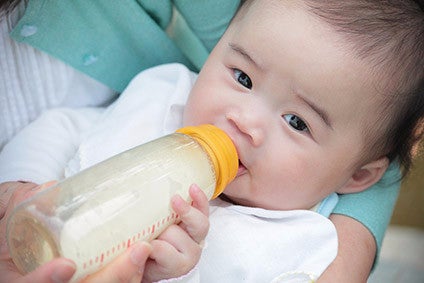
Biostime International Holdings was another infant formula business operating in China to see its sales come under pressure in the first half of 2016 but expressed optimism the recent changes to regulation in the country on recipes and births would boost the sector from next year.
The Hong Kong-listed group yesterday (23 August) reported higher half-year group sales and earnings, helped by the first full half of results from Australian supplements company Swisse Wellness Group, which the company acquired last September.

Discover B2B Marketing That Performs
Combine business intelligence and editorial excellence to reach engaged professionals across 36 leading media platforms.
However, Biostime said sales from its baby nutrition and care division, which generates over 57% of the company’s turnover, fell 12.2% in the first half of 2016. The company pointed to the “significant de-stocking” of infant formula products in China, which it said led to “aggressive” competition and a fall in industry volumes.
Biostime saw the gross profit it makes from the division dip 1.4% but said the unit grew its gross profit margin. It said its product mix improved, with the company selling more of the higher-margin Biostime infant formula. The business also cut prices less and turned more of its promotional activities to “value-added consumer rewarding programmes”. Margins were also helped by the low price of dairy commodities.
Looking ahead, Biostime said it expects China’s infant formula sector to continue to feel the impact of the recent regulatory changes in the short term. However, the company’s outlook for 2017 was brighter.
“In the short term, the group believes that the infant milk formula market will continue to be overshadowed by the regulatory environment due to the newly-released infant milk formula recipes registration rules, but the mid-long term positive impact of the new regulations will also represent an opportunity for the group to strengthen its market position in light of expected industry consolidation. Furthermore, the full implementation of two-child policy is likely to provide a much-needed boost to the demand of infant milk formula products starting from 2017,” Biostime said.

US Tariffs are shifting - will you react or anticipate?
Don’t let policy changes catch you off guard. Stay proactive with real-time data and expert analysis.
By GlobalDataIt added: “To drive future business growth and product differentiation, the group plans to launch an organic infant milk formula range under the Healthy Times brand at the end of this year to increase [its] exposure to [the] fast-growing organic segment.”
For the six months to the end of June, Biostime booked group revenue of CNY3.01bn (US$452.1m), up 53.3% on the first half of 2015. EBITDA more than trebled from the CNY295.2m generated in the first half of 2015 to CNY949.9m. Net profit almost doubled from CNY205m to CNY404.9m.
Pablo Zuanic, an analyst at US investment and trading firm Susquehanna International Group covering the shares of infant formula group Mead Johnson, said the results from Biostime’s infant formula business in the first half of 2016 were “consistent with the lacklustre results reported by other companies in the space, including Synutra, Nestle, Danone, and Mead Johnson”.
He added: “The company’s 1H16 performance and confirmation of the disruption and uncertainty caused by recent regulatory changes – deemed to be good in the long term – all echo disappointing IMF trends reported by other companies, including Mead Johnson. However, the company is rather constructive on the industry outlook, projecting double-digit infant milk formula volume growth (its sales fell 14% in 1H16) in 2017, with the effect of the new two-child policy leading to an incremental 5.8m births, on a base of 16-17m.





